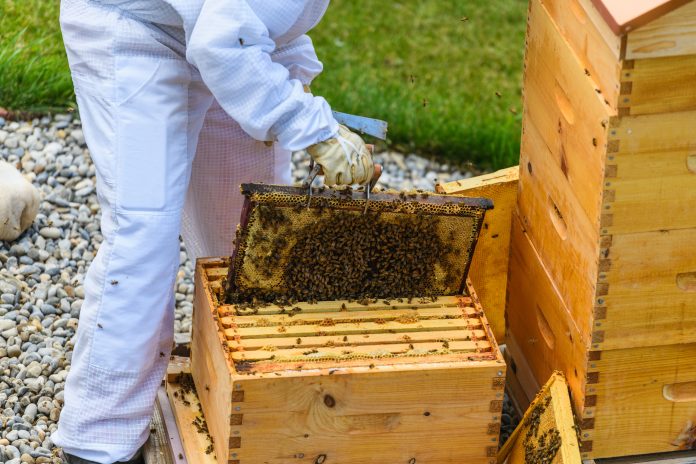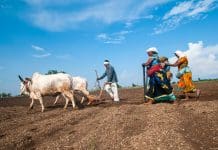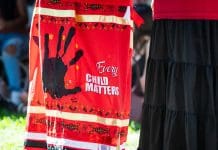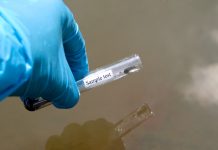Organization in the form of associations and commissions play a pivotal role in the success of any agricultural industry
This article details the role that the Alberta Beekeepers Commission plays regarding governance, collaboration, and advocacy within Alberta’s beekeeping and honey production industry.
The Alberta Beekeepers Commission (the Commission) was established in 2006, following the separation of commercial beekeepers and hobby beekeepers into their own respective groups. Alberta then became the only province in Canada where anyone with bees or beekeeping equipment is required to register their bees with the government. Furthermore, the Commission regulations state that anyone who has 100 hives or more automatically becomes a member of the Commission, and anyone with 99 hives or fewer would be classified as a hobby beekeeper. Those with 100 hives or more are referred to as eligible producers, and the Commission collects a levy based on a certain amount per hive in order to carry out their activities.
The Alberta Beekeepers Commission itself exists by orders and council. There are approximately 23 boards and commissions, and the Alberta Beekeepers Commission sits under the umbrella of an organization called the Marketing Council which reports to the Provincial Minister of Agriculture. Through this relationship, the Commission is led by a governance structure that guides them in terms of what they are permitted to do and what they are not permitted to do through a series of regulations and a set of bylaws.
The primary purpose of the Commission is to advocate for the provision of services to fund research that will enhance beekeeping in Alberta. Because of this, the Commission invests a lot of time in building and maintaining government relations at the different levels of government.
Significant energy is also invested in raising awareness about beekeeping in Alberta. When the Commission conducted a survey and asked people to identify a bee within a series of pictures, the majority of people would pick out the Bumblebee; however, most people do not know what honeybees are. Therefore, part of the advocacy work done by the Commission is creating awareness and understanding of the industry, along with its many layers and complexities. This may include creating awareness of the direct economic contributions that honeybees make, such as the pollination of various crops in the province.
The Commission hosts tradeshows in various counties where individuals are interested in getting into beekeeping and hosts workshops/webinars to help increase the awareness of the technical needs and challenges that beekeepers are facing throughout the province. They also host an annual honey contest to raise awareness related to value-added honey products.
Collaboration between the Alberta Beekeepers Commission and the Provincial Government
The Alberta Beekeepers Commission has a history of collaborating with the provincial government. For example, in 2019, together they established a tech team with hired scientists to initiate a colony health monitoring program. The program has a client base of around 29 beekeepers from which samples are collected and analyzed for different types of viruses, bacterial infections, and parasites. Having a yearly surveillance program helps to understand the current trends and predict future trends. To expand the program, surveillance and analysis may be extended to understanding the health status of hives related to different climatic regions in the province, as well as foraging patterns related to weather events (rain, cloudiness, smoke, heat) that impact crop production and the quality of honey produced.
The Commission continuously collaborates with regulatory actors in the provincial government responsible for legislating the Bee Act. The collaboration stems from the shared interest in particular topics from both sides. One such example is Varroa mite resistance to certain treatments. The Commission is able to work together with regulatory actors to collect data and to establish decision-making priorities and programs. These policy actors, along with provincial Ministers, will often advocate for the Commission on their behalf with the other ministries in the province and on the federal level.
The Commission also frequently collaborates with Trade and Investment government actors. For example, recently, the United Arab Emirates (UAE) expressed interest in importing honey from Alberta. The Commission was able to work with the provincial government to send representatives to the UAE to market Alberta’s honey, present their export catalogue, and connect individual beekeepers to international buyers and markets.
At the federal level, the commission collaborates with the Canadian Honey Council (the Council), a board that is made up of representatives from every province. A recent example of collaboration was with regard to one of Canada’s major export markets for honey, Japan. Japan was concerned about residues in honey, particularly glyphosate residue and residues from broadleaf pesticides. The commission collaborated with the Council to resolve this issue, as well as improve labels on the honey containers that go to retail.
On the other hand, the Commission seldom collaborates at the local level with municipal governments or county governments, as hobby beekeeping groups are more active at this level.
The Alberta Beekeepers Commission’s focus on research
The Commission has a Board which houses the Research and Projects Committee. This Committee makes decisions regarding the type of research the Commission will focus on. In recent years, the research has been largely focused on the Varroa mite due to it being the most prominent issue in beekeeping. The mite acts as a vector for other diseases by weakening the hive and leaving behind different types of viruses. Another significant research topic that has emerged in recent years is the issue of honey adulteration. As a result of the research being conducted, the Commission established an assurance system through a third-party auditor. The third major research topic is overwintering due to the devastating losses of bees that occur each year. Research is being conducted on how to replace stock and Queens in an effective manner, with a particular focus on raising stock and Queens in the province to be ready for the April season instead of importing replacement stocks and Queens.
The Commission is also currently looking into research related to waste reduction, specifically waste honey or dirty honey at the end of a run, along with researching different solutions to reduce the amount of plastic waste created during honey processing. In relation to this research, a partnership was built between the Commission and the University of Alberta mechanical engineering department. Within the department, students have helped the Commission with designing overwintering buildings, honey dispensers, and base water systems. Coincidentall,y this partnership also raises awareness about beekeeping in Alberta. Students come in with one notion about what beekeeping in Alberta is, and then they become more aware while working on these projects and collaborating with beekeepers and honey producers themselves, which not only changes their perception but also their interest in the industry.
For further reading
Tymczak, A. (2025). Navigating Challenges and Opportunities in Alberta’s Small-Scale Agricultural Sector: Pathways for New Entrants, Knowledge Transfer, and Institutional Barriers. University of Alberta. DOI: [10.7939/81811] https://ualberta.scholaris.ca/items/88b0ab26-c882-4aecbaf1-cd759c0ca388








